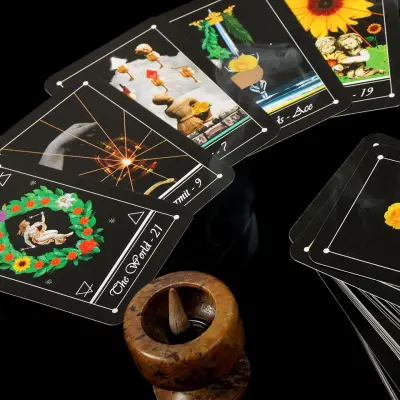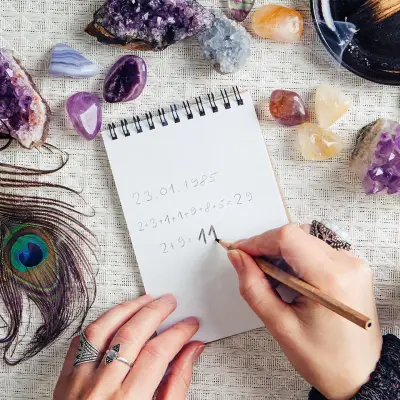Have you ever found yourself feeling disconnected or uncertain about your path in life? Perhaps you're wondering if there’s something deeper that you're meant to do, a purpose that will bring you fulfilment and peace. This is where soul searching comes in. It’s a process that many people go through when they’re looking to discover who they really are and what they truly want out of life. In this post, we’ll explore what soul searching means, why it's important, and how you can start your own journey toward finding your purpose.
Jump To:
Recommended for you!
Best SellersWhat is Soul Searching?
Soul searching is the act of exploring your inner self to understand your true desires, values, and motivations. It’s about digging deep within to find out what really matters to you, beyond societal expectations or superficial goals. The meaning of soul searching involves reflecting on who you are and what you stand for, helping you to align your actions with your core beliefs.
If you're wondering, what is a soul searcher? The term refers to someone who actively seeks to uncover the truths of their own existence. This process might include asking profound questions like, what does my soul want? and searching for answers that lead to self-discovery and clarity.
Why is Soul Searching Important?

In today's fast-paced world, it's easy to lose sight of your true self, caught up in the demands of daily life. Soul searching offers an opportunity to pause, reflect, and realign your life with your innermost desires. It's an essential step in finding your purpose, as it allows you to move away from the noise and pressures of external influences and get to the heart of what will bring you joy and fulfilment.
One of the key aspects of this process is finding yourself. When you engage in soul searching, you begin a journey of self-discovery that can lead to a deeper understanding of your own identity and purpose. This process isn't about following a predetermined path but rather discovering the unique journey that’s right for you.
How Do You Know What Your Soul Wants?
The process of soul searching ultimately leads to understanding what your soul truly desires. But how do you know when you're aligned with your soul? You'll often experience a sense of peace and clarity when you're on the right path. You may feel more connected to your inner self, and your actions will begin to reflect your deepest values.
Tuning into your soul requires patience and a willingness to listen. Trust that as you continue to explore and reflect, your purpose will become clearer.
How to Start Soul Searching

If you're ready to begin soul searching, the first step is to set aside time for reflection. This might mean finding a quiet space where you can think without distractions, or it might involve taking a break from your usual routine to focus inwardly. Here are some practical exercises to help you get started:
1. Journaling
Writing down your thoughts and feelings in a journal can be a powerful tool for self-discovery. By putting your thoughts on paper, you allow yourself to process them more clearly. Ask yourself questions such as:
- What do I truly care about?
- What makes me feel fulfilled?
- What do I want to contribute to the world?
Reflecting on these questions regularly can provide valuable insights into your deeper desires and motivations.
2. Meditation and Mindfulness
Meditation helps quiet the mind, making space for your inner voice to be heard. Regular mindfulness practice can help you stay present and connected to your true self. By calming the mental chatter, you can tune in to what your soul is trying to tell you.
3. Connecting with Nature
Nature has a way of bringing clarity and peace to your mind. Spending time outdoors, whether it’s a walk in the park or a hike in the mountains, can provide a fresh perspective. The natural world can often inspire a sense of calm, helping you reflect more deeply on your purpose.
4. Spiritual Practices
For some, soul searching involves connecting with spiritual practices such as prayer, attending religious services, or exploring philosophical teachings. These practices can offer guidance and wisdom as you search for meaning in your life.
How to Discover Your Purpose

Once you’ve started soul searching, the next step is to focus on finding your purpose. This isn't always a straightforward task, and it often requires patience and persistence. Here are a few steps you can take to guide you in discovering your life's purpose:
1. Identify Your Passions
What activities bring you joy? What do you feel passionate about? These can be important clues in uncovering your purpose. Whether it's creative work, helping others, or solving problems, your passions often align with the work you're meant to do in the world.
2. Assess Your Strengths
Consider what you're naturally good at. What skills or talents do you possess that come easily to you? Often, your purpose is linked to the strengths you have developed over time. When you align your strengths with your passions, you are more likely to find a sense of fulfilment in your work and life.
3. Consider Your Values
Your values are the core beliefs that guide your decisions and actions. What principles are most important to you? Whether it's honesty, compassion, or justice, your values can help you shape a life that is aligned with your purpose.
4. Reflect on Your Past Experiences
Sometimes, the challenges or difficulties you’ve faced can offer insights into your purpose. Think about the lessons you've learned and the ways you've grown. How might these experiences shape the path you're meant to take?
Can You Soul Search While in a Relationship?
One common question is whether you can soul search while being in a relationship. The answer is yes. In fact, soul searching can often enhance your relationship by helping you to understand yourself better, which allows you to communicate more effectively with your partner. When you're clear on your own needs and desires, you're better able to share those with others and create a more fulfilling connection.
If you're in a relationship, it's important to communicate with your partner about your desire to explore your inner self. Being open about your journey can strengthen your relationship as you support each other’s growth.
Exercises for Soul Searching

If you're looking to go deeper in your soul-searching journey, here are a few exercises that can help you uncover more about yourself:
- Vision Board Creation: Create a vision board that represents your dreams and desires. This can help clarify what you want to achieve and the life you want to live.
- Questioning Yourself: Ask yourself reflective questions daily. For example, "What would I do if I weren't afraid?" or "What legacy do I want to leave?"
- Doing Shadow Work: Explore the aspects of yourself that you may avoid or suppress. This involves acknowledging fears, weaknesses, or regrets, and learning from them.
Recommended for you!
Best SellersFrequently Asked Questions About Soul Searching
Is soul searching a one-time process?
Soul searching is not a one-time process; it’s something you may revisit throughout your life. As you grow and evolve, your desires and values may change, requiring you to reflect on your direction once again. Soul searching is an ongoing journey of self-awareness and personal growth, allowing you to continually refine your purpose as you encounter new experiences.
Where is the Best Place to Go for Soul Searching?
There’s no one-size-fits-all answer when it comes to where to soul search. Some people find that travelling to a new place helps them gain perspective, while others prefer to stay close to home and create a peaceful environment for reflection. The key is finding a place that allows you to connect with your inner self, whether that’s through solitude in nature or simply creating a quiet space at home.
What role does spirituality play in soul searching?
For many people, spirituality plays a significant role in soul searching. It can provide guidance, wisdom, and a deeper sense of connection to something greater than oneself. Whether through prayer, meditation, or exploring spiritual teachings, connecting with your spirituality can help you better understand your purpose and the meaning of your life. However, soul searching can also be done from a non-spiritual perspective, focusing on personal values and self-awareness.
How do you stay focused during the soul-searching process?
Staying focused during soul searching can be challenging, especially with the distractions of life. Setting aside dedicated time each day for reflection can help, as can practising mindfulness to stay present. Keeping a journal to track your thoughts and insights over time can also be useful for maintaining focus. It’s important to be patient with yourself, as the process of self-discovery can take time.
How do you know if you’ve found your purpose?
When you’ve found your purpose, you’ll often feel a deep sense of fulfilment and peace. Your actions will align with your values, and you’ll have a clear sense of direction in life. You might also notice that you’re more motivated and passionate about your pursuits. Finding your purpose is not always an immediate revelation, but rather a gradual process of self-discovery and alignment with your inner desires.
Study Soul Retrieval for £29
If you're ready to dive deeper into your own soul searching journey, why not explore our Soul Retrieval Diploma Course? It's designed to help you reconnect with your true self, offering practical guidance and spiritual insights. For a limited time, you can enrol in this course for a discounted price of £29!













